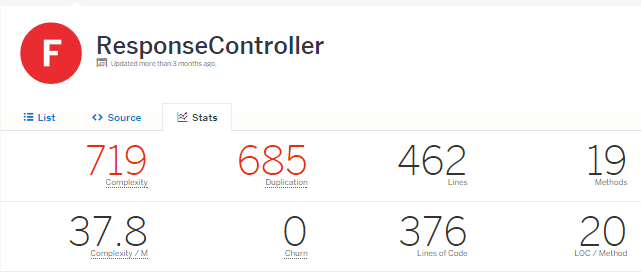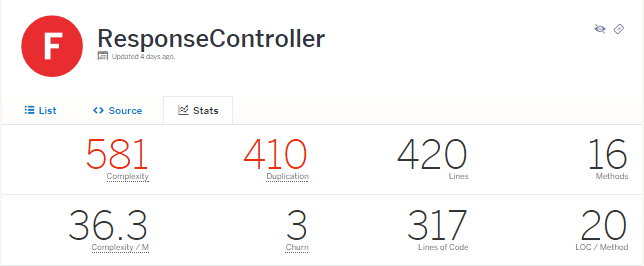CSC/ECE 517 Fall 2014/oss E1458 sst
E1458: Expertiza - Refactoring ResponseController
Expertiza
Expertiza is a peer review based course management system. It supports project submission,team creation, and review of the submitted material including URLs and wiki pages. Students can manage teammates and can conduct reviews on other's topics and projects. Expertiza is an open source project based on Ruby on Rails.
Background
As a part of the OSS project 1 we were expected to refactor the Response Controller of Expertiza. Response Controller is responsible for managing the review versions, finding the latest responses and fetching the review scores. This wiki provides a detailed walk through of our contributions to the Expertiza project with a focus on refactoring.
Project Description
The response controller allows the user to create and edit responses to questionnaires such as performing a review, rating a teammate or giving feedback to a reviewer. Our project requirement was to perform the following changes :
- Perform authorization properly.
- Remove the duplicated methods.
- Reduce the complexity of the rereview method.
- Move the functionality incorporated in the controller, to the model, as it is the model's responsibility to implement this functionality.
Refactoring carried out
The following changes have been made in the project, as described in the requirements document.
Perform Authorization correctly
- Authorization to perform actions was done incorrectly via the redirect_when_disallowed method. It is supposed to be done through the action_allowed? method at the beginning of the class definition. Different authorizations are required for different operations.
- For example, someone should be allowed to view a response if they wrote the response, or they are the person or on the team whose work the response is applied to, or if they are an instructor or Teaching Assistant for the class. The person who wrote a response should be allowed to edit it, but not the person/team who was being reviewed, nor the instructor and neither the Teaching Assistant for the class.
- Earlier, the authorization was handled by denying incorrect access using the redirect_when_disallowed method, which was a more error-prone way of controlling access. This method has now been removed, and now the class has an action_allowed? method which does the authorization check and allows the user to perform the action only if he/she has the correct permissions.
Before Refactoring:
redirect_when_disallowed Method was used for authorization purposes.
def redirect_when_disallowed(response)
# For author feedback, participants need to be able to read feedback submitted by other teammates.
# If response is anything but author feedback, only the person who wrote feedback should be able to see it.
if response.map.read_attribute(:type) == 'FeedbackResponseMap' && response.map.assignment.team_assignment?
team = response.map.reviewer.team
unless team.has_user session[:user]
redirect_to '/denied?reason=You are not on the team that wrote this feedback'
else
return false
end
response.map.read_attribute(:type)
end
!current_user_id?(response.map.reviewer.user_id)
end
After Refactoring:
We replaced the redirect_when_disallowed Method by action_allowed? Method.
def action_allowed?
case params[:action]
when 'view', 'edit', 'delete', 'rereview', 'update'
if response.map.read_attribute(:type) == 'FeedbackResponseMap'
team = response.map.reviewer.team
if team.has_user session[:user]
flag= true
else
flag=false
end
end
else
flag=true
end
return flag
end
Removal of redundant methods
- There were two copies of the edit, new_feedback and view methods. The second being the newer one, and, according to the rules for method definition, is the one that is currently in use because the latest version overrides the previous versions. We refactored the code by removing the redundant methods for edit, new_feedback and view.
Edit method:
def edit
@header = "Edit"
@next_action = "update"
@return = params[:return]
@response = Response.find(params[:id])
return if redirect_when_disallowed(@response)
@map = @response.map
array_not_empty=0
@review_scores=Array.new
@prev=Response.all
for element in @prev
if (element.map_id==@map.map_id)
array_not_empty=1
@review_scores << element
end
end
if @prev.present?
@sorted=@review_scores.sort { |m1, m2| (m1.version_num and m2.version_num) ? m2.version_num <=> m1.version_num : (m1.version_num ? -1 : 1) }
@largest_version_num=@sorted[0]
end
@response = Response.where(map_id: @map.map_id, version_num: @largest_version_num.version_num).first
@modified_object = @response.response_id
get_content
@review_scores = Array.new
@question_type = Array.new
@questions.each do |question|
@review_scores << Score.where(response_id: @response.response_id, question_id: question.id).first
@question_type << QuestionType.find_by_question_id(question.id)
end
# Check whether this is a custom rubric
if @map.questionnaire.section.eql? "Custom"
@next_action = "custom_update"
render :action => 'custom_response'
else
# end of special code (except for the end below, to match the if above)
#**********************
render :action => 'response'
end
end
New_feedback method:
def new_feedback
review = Response.find(params[:id])
if review
reviewer = AssignmentParticipant.where(user_id: session[:user].id, parent_id: review.map.assignment.id).first
map = FeedbackResponseMap.where(reviewed_object_id: review.id, reviewer_id: reviewer.id).first
if map.nil?
map = FeedbackResponseMap.create(:reviewed_object_id => review.id, :reviewer_id => reviewer.id, :reviewee_id => review.map.reviewer.id)
end
redirect_to :action => 'new', :id => map.map_id, :return => "feedback"
else
redirect_to :back
end
end
View method:
def view
@response = Response.find(params[:id])
return if redirect_when_disallowed(@response)
@map = @response.map
get_content
@review_scores = Array.new
@question_type = Array.new
@questions.each do |question|
@review_scores << Score.where(response_id: @map.response_id, question_id: question.id).first
@question_type << QuestionType.find_by_question_id(question.id)
end
end
Cleaning up of the rereview moethod
- The rereview method was 98 lines long. We refactored the code by turning several parts of it into methods. Now the code is 81 lines long.
Before Refactoring:
def rereview
@map=ResponseMap.find(params[:id])
get_content
array_not_empty=0
@review_scores=Array.new
@prev=Response.all
#get all versions and find the latest version
for element in @prev
if (element.map.id==@map.map.id)
array_not_empty=1
@review_scores << element
end
end
latestResponseVersion
#sort all the available versions in descending order.
if @prev.present?
@sorted=@review_scores.sort { |m1, m2| (m1.version_num and m2.version_num) ? m2.version_num <=> m1.version_num : (m1.version_num ? -1 : 1) }
@largest_version_num=@sorted[0]
@latest_phase=@largest_version_num.created_at
due_dates = DueDate.where(["assignment_id = ?", @assignment.id])
@sorted_deadlines=Array.new
@sorted_deadlines=due_dates.sort { |m1, m2| (m1.due_at and m2.due_at) ? m1.due_at <=> m2.due_at : (m1.due_at ? -1 : 1) }
current_time=Time.new.getutc
#get the highest version numbered review
next_due_date=@sorted_deadlines[0]
#check in which phase the latest review was done.
for deadline_version in @sorted_deadlines
if (@largest_version_num.created_at < deadline_version.due_at)
break
end
end
for deadline_time in @sorted_deadlines
if (current_time < deadline_time.due_at)
break
end
end
end
#check if the latest review is done in the current phase.
#if latest review is in current phase then edit the latest one.
#else create a new version and update it.
# editing the latest review
if (deadline_version.due_at== deadline_time.due_at)
#send it to edit here
@header = "Edit"
@next_action = "update"
@return = params[:return]
@response = Response.find_by_map_id_and_version_num(params[:id], @largest_version_num.version_num)
return if redirect_when_disallowed(@response)
@modified_object = @response.response_id
@map = @response.map
get_content
@review_scores = Array.new
@questions.each {
|question|
@review_scores << Score.find_by_response_id_and_question_id(@response.response_id, question.id)
}
#**********************
# Check whether this is Jen's assgt. & if so, use her rubric
if (@assignment.instructor_id == User.find_by_name("jace_smith").id) && @title == "Review"
if @assignment.id < 469
@next_action = "update"
render :action => 'custom_response'
else
@next_action = "update"
render :action => 'custom_response_2011'
end
else
# end of special code (except for the end below, to match the if above)
#**********************
render :action => 'response'
end
else
#else create a new version and update it.
@header = "New"
@next_action = "create"
@feedback = params[:feedback]
@map = ResponseMap.find(params[:id])
@return = params[:return]
@modified_object = @map.map_id
get_content
#**********************
# Check whether this is Jen's assgt. & if so, use her rubric
if (@assignment.instructor_id == User.find_by_name("jace_smith").id) && @title == "Review"
if @assignment.id < 469
@next_action = "create"
render :action => 'custom_response'
else
@next_action = "create"
render :action => 'custom_response_2011'
end
else
# end of special code (except for the end below, to match the if above)
#**********************
render :action => 'response'
end
end
end
After Refactoring:
def rereview
@map=ResponseMap.find(params[:id])
get_content
array_not_empty=0
@review_scores=Array.new
@prev=Response.all
#get all versions and find the latest version
for element in @prev
if (element.map.id==@map.map.id)
array_not_empty=1
@review_scores << element
end
end
@review_scores=response.getAllResponseVersions
#sort all the available versions in descending order.
if @prev.present?
@largest_version_num = Response.get_largest_version_number(@review_scores)
@latest_phase=@largest_version_num.created_at
due_dates = DueDate.where(["assignment_id = ?", @assignment.id])
@sorted_deadlines = DueDate.sort_deadlines(due_dates)
current_time=Time.new.getutc
#get the highest version numbered review
next_due_date=@sorted_deadlines[0]
#check in which phase the latest review was done.
for deadline_version in @sorted_deadlines
if (@largest_version_num.created_at < deadline_version.due_at)
break
end
end
for deadline_time in @sorted_deadlines
if (current_time < deadline_time.due_at)
break
end
end
end
#check if the latest review is done in the current phase.
#if latest review is in current phase then edit the latest one.
#else create a new version and update it.
# editing the latest review
if (deadline_version.due_at== deadline_time.due_at)
#send it to edit here
@header = "Edit"
@next_action = "update"
@return = params[:return]
@response = Response.where(map_id: params[:id], version_num: @largest_version_num.version_num).first
@modified_object = @response.response_id
@map = @response.map
get_content
@review_scores = Array.new
@questions.each {
|question|
@review_scores << Score.where(response_id: @response.response_id, question_id: question.id).first
}
#**********************
# Check whether this is Jace's assgt. & if so, use her rubric
if (check_user_name_jace? && @title == "Review")
handle_jace_kludge
else
# end of special code (except for the end below, to match the if above)
#**********************
render :action => 'response'
end
else
#else create a new version and update it.
@header = "New"
@next_action = "create"
@feedback = params[:feedback]
@map = ResponseMap.find(params[:id])
@return = params[:return]
@modified_object = @map.map_id
get_content
#**********************
# Check whether this is Jen's assgt. & if so, use her rubric
if (check_user_name_jace? && @title == "Review")
handle_jace_kludge
else
# end of special code (except for the end below, to match the if above)
#**********************
render :action => 'response'
end
end
end
Creation of a Kludge
- The rereview method contained a special code to check whether an assignment is “Jace’s assignment”; this was the first assignment that was ever created with a multipart rubric. It was hard-coded into the system, rather than working on a rubric that was created in the normal way. It is impossible to remove this code without breaking that assignment. It is now implemented as a separate method named handle_jace_kludge.
Before Refactoring:
The following code was present in the rereview method.
# Check whether this is Jen's assgt. & if so, use her rubric
if (@assignment.instructor_id == User.find_by_name("jace_smith").id) && @title == "Review"
if @assignment.id < 469
@next_action = "update"
render :action => 'custom_response'
else
@next_action = "update"
render :action => 'custom_response_2011'
end
else
# end of special code (except for the end below, to match the if above)
render :action => 'response'
end
After Refactoring:
We added two methods named 'handle_jace_kludge' and 'check_user_name_jace?'
def check_user_name_jace?
return @assignment.instructor_id == User.find_by_name("jace_smith").id
end
def handle_jace_kludge
# ** if assignment belongs to Jace handle it depending on the assignment id **
if @assignment.id < 469
@next_action = "update"
render :action => 'custom_response'
else
@next_action = "update"
render :action => 'custom_response_2011'
end
end
Moved methods from Response Controller to appropriate models
- Sorting review versions is not a controller responsibility; So we moved it to the Response model.
def self.get_largest_version_number(review_scores)
@sorted=@review_scores.sort { |m1, m2| (m1.version_num and m2.version_num) ? m2.version_num <=> m1.version_num : (m1.version_num ? -1 : 1) }
@largest_version_num=@sorted[0]
end
- Similarly, the logic for determining whether a review is current or not(i.e., the review was done during the current assignment phase) is not a controller's responsibility and thus was moved to the Response model.
def self.getAllResponseVersions
#get all previous versions of responses for the response map.
@review_scores=Array.new
@prev=Response.where(map_id: @map.id)
@prev.each do |element|
@review_scores << element
end
return @review_scores
end
Results
Although ResponseController is a complex class, we managed to improve its code significantly through refactoring. We made use of Code Climate in order to run analysis of our changes against the original Expertiza code. We have managed to reduce the overall complexity of this class from 719 to 581 and duplication from 685 to 410. Also one of the major refactoring was performed on "rereview" method. We have managed to reduce its complexity from 129 to 91 by extracting methods.
Original ResponseController on Codeclimate:<ref>https://codeclimate.com/github/expertiza/expertiza/ResponseController</ref>
ResponseController on Codeclimate after Refactoring:
External Links
- 1. Expertiza
- 2. VCL Link
References
<references/>



